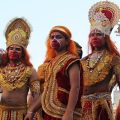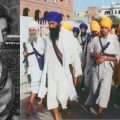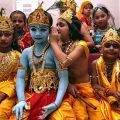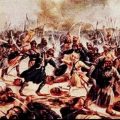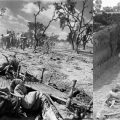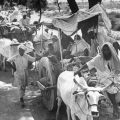4.75m Hindus Killed/Displaced in Pak in 1947; Plight of Who Remained is Worse
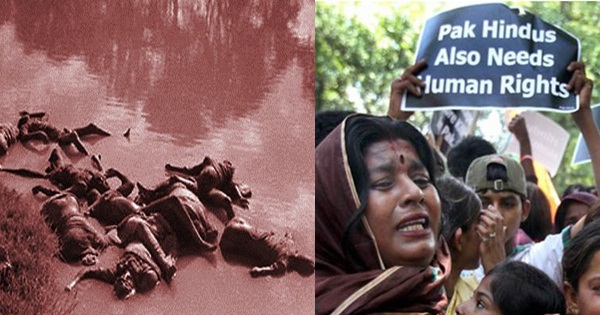
Perpetrator: Islamic militants in (West) Pakistan, Pakistan Military.
Year/ Period: 1941-1951.
Number: 4.75 Million Hindus (7 Million including Sikhs) killed, forcibly converted to Islam or forced to flee.
The plight of West Pakistani Hindus, those Hindus who chose to remain behind in West Pakistan at the time of the partition of India, unwittingly agreeing to a lifetime of atrocities, is as yet unknown to mainstream population of Hindus around the world. Hindus of West Pakistan suffered terribly during partition, and continue to do so.
Exodus of Hindus and Sikhs from West Pakistan
The demography of West Pakistan underwent a drastic change during partition of India: there was an influx of 4 million Muslims into Pakistan side, and more than 7 million Hindus and Sikhs were expunged from their homes, forced to cross the border into India.
Many claim that there was a mass exodus from both sides, and that this was an outcome of irrational fears of both religious groups, but reality was far from irrational.
Starting from 1946 onwards, in many Muslim majority districts, unprovoked attacks on Hindus and Sikhs began. Houses were burnt and Hindus were killed.
“On 18.12.1946 in Garhi Habibullah, in Mansehra Tehsil, one Hindu was abducted and later found killed. In Havelian and Lahore (Hazara), commencing on the same date anti-Hindu-Sikh rioting continued well on into January, 1947. A massacre of Hindus and Sikhs in Havelian was averted only by the timely arrival of the military; but stray killing of Hindus and Sikhs continued for weeks. By the end of December, 1946 conditions in the Havelian area had deteriorated so far that all Hindus and Sikhs of this area had to leave their homes and property at the mercy of the Muslim marauders, and seek safety of life and honour in the Punjab.”
Muslim League Attack on Sikhs and Hindus in the Punjab 1947, Chapter 3
Many parts of West Punjab suffered badly at the hands of Muslim goons, who resorted to every possible cruelty to expunge or kill Hindus and Sikhs.
“Sheikhupura Hindus and Sikhs were perhaps, after Rawalpindi and Multan, the worst sufferers at the hands of the Pakistani fanaticism and cold-blooded murderous frenzy. The blow fell on them suddenly and swifly-leaving between 10,000 and 20,000 of them dead in two days.”
Muslim League Attack on Sikhs and Hindus in the Punjab 1947, Chapter 10
Many of the Hindus and Sikhs were unsuspecting of the horrors that would be unleashed on them, and had little time to save themselves or prepare to leave. They had to migrate leaving behind everything.
Most important factor in this massacre of Hindus and Sikhs is that the Pakistan government and military was directly involved and responsible for atrocities on Hindus. This was not the work of Muslim mobs alone. This was a planned move by Pakistan and an attempt at ethnic cleansing of Hindus and Sikhs from Pakistan. Many Hindus and Sikhs moved to refugee camps, from where they were moved later. Loot, arson, rape were common.
“In the rural areas the attacks began round about the beginning of September. By that time the whole of the West Punjab was in flames, so to speak. Hindus and Sikhs were being attacked everywhere and were largely on the move to India. Lyallpur Sikhs were the last to be attacked and it was the Pakistan Military alone which felt confident of handling them.”
Muslim League Attack on Sikhs and Hindus in the Punjab 1947, Chapter 10
The refugees who were making their way to India were constantly attacked, shot at and looted. They were walking on their death marches.
“Many died on the way, especially the young, the old and the sick. The roads were all full of stench at every few yards from dying cattle. It was to this state that Pakistan had reduced the best and most prosperous colonists which India has in recent times known.”
Muslim League Attack on Sikhs and Hindus in the Punjab 1947, Chapter 10
Similar hate crimes continued on the refugees who were traveling to India via trains. Trains were stopped, people in the trains were starved, shot at or stabbed.
“Towards the beginning of September, a Hindu-Sikh refugee train coming from West Punjab was attacked by a Muslim mob, abetted by the police and military, at Kamoke…Most of the male refugees were butchered or shot dead. The women were sorted. The elderly ones were later butchered, while the younger ones were distributed. Children were murdered by being flung with force on the ground.”
Muslim League Attack on Sikhs and Hindus in the Punjab 1947, Chapter 10
The entire state of Punjab was ablaze under the atrocities of Pakistan military and Muslim militants. But the saddest part is that this part of Hindu history does not find mention in a single history book. Many Hindus and Sikhs of Punjab itself are still ignorant of what their ancestors underwent during the partition of India.
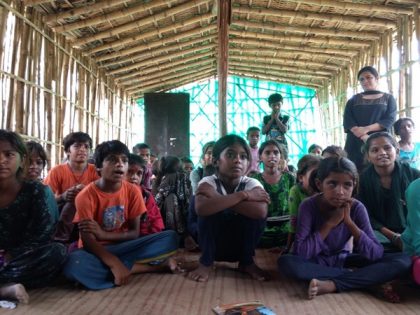
Pakistani Hindu children in India; Image clicked by author Arti Agarwal.
Insufficient Documentation & Mis-Labeling Of The Genocide
Another remarkable aspect of the pogroms of Punjab is the fact there is very little authentic, proper documentation of these massacres, even though millions of lives were affected by it. It makes one balk to think that mass killings of this scale were not even accounted, documented, nor anyone held accountable. No government authorities or human rights organizations even looked into these large scale massacres; if anything, this information has all but been completely destroyed.
Due to this utter disinterest in documenting or recording the details and extent of the atrocities, there is an inclination to mis-label them as “riots” or “communal war of secession” (as noted by Paul Brass). It is imperative to label these pogroms correctly as a genocide. This mis-labeling does grave injustice to those who suffered in the most brutal way & undermines the damage done to the country.
No attempts at salvaging the wrongs, or bringing the victims to justice were ever made, neither by Indian authorities, nor Pakistan, nor any international organization. The genocide affected 7 million people – a number bigger than the Jewish genocide! Yet, there is little outcry or even information about this in the mainstream masses.
“With all the political, historical, and polemical argument that has been waged on these issues and all the ink that has been spilt over it, it is a very puzzling and extremely regrettable matter that there has been so little significant, accurate, detailed reporting and accounting of precisely what happened: how the migrations and violence associated with partition did in fact happen and what were the feelings, attitudes, and consequences for the sufferers.”
Demographic Changes In West Pakistan
Statistically speaking, the number of Hindus in West Pakistan reduced from 15% to 1.6% from the time of partition to now. But the biggest change in this percentage happened in the period of 1946 to 1951, as is borne out by the statistical analysis of the population of Hindus in Pakistan.
Population of Pakistan in 1941: 29 million
Hindus in 1941: 14% of 29 million = 4.06 million
Population of Pakistan in 1951: 33.7 million
Hindus in 1951: 1.3% of 33.7 million = 0.4381 million
Hindus in 1998: 2,443,614 (including SC/ST), or 2.02%
Statistics of population of Hindus in Pakistan are not available for 1947. But reports from 1948 place the figure of Hindu immigrants from Pakistan to India at 4.75 million.
Below is a comparison of growth rate of overall population of Pakistan, with the growth rate of Hindu population in Pakistan. Numbers alone fail to give the complete picture of how the growth of Hindus in Pakistan has not only been slow, but almost stunted for decades.
Hindu Human Rights in Pakistan
The saga of atrocities on Hindus and Sikhs in Pakistan does not end with partition, sadly.
Hindus who remained in Pakistan as minorities were discriminated against in every way, legally and illegally, and denied the most basic human rights. There was a continuous threat to their very existence, as the jihadi ideology of the Muslim state endorses converting every last man, woman and child to their fold.
Until 2017, when the Hindu marriage act was passed by the National Assembly of Pakistan, there was no legal recognition of a Hindu marriage as per laws of Pakistan. This meant that the marriage would not be recognized as kosher anywhere in the world. It is to be noted that this is till not a law all over Pakistan. The law applies only in three provinces – Punjab, Balochistan and Khyber Pakhtunkhwa and the capital territory around Islamabad.
Earlier, Sindh province passed its own bill to permit legal registration of Hindu marriages in February, 2016. But this bill included a controversial clause that says that the marriage stands annulled if one of the spouse converts. This clause does nothing to check abductions and forced conversions.
A high percentage of Hindus in Pakistan are SC/STs, and are employed by landlords literally as slaves. The landlords mint heavy profits, but the Hindus, who work as bonded labourers, are paid in pennies and remain in poverty. They are denied a proper education, which destroys their prospects at a better livelihood. The National Assembly of Pakistan abolished the Bonded Labour Act in 1992, but bonded labour is still practiced widely, especially in Sindh.
Sindh Pakistan, where half of the population is Hindu, 84.7% people lived under the poverty line. In 2012-13, the figure stood at 80.7%, and in 2010-11 [at] 75.9%
There is no law which explicitly condemns and bans conversions. This means that it is a dead end to fight for the rights of Hindus who are converted to Islam by unfair means, usually forcibly.
“In Pakistan, blasphemy laws, rather than anti-conversion laws, are used to criminalize conversion and proselytization and thereby limit the rights of religious minorities. Additionally, there is a prevalent, and increasing, problem of Muslims converting non-Muslims by force in Pakistan, yet Christians and Hindus who are actual victims of forced conversion to Islam have few legal remedies. In 2017, Prime Minister Nawaz Sharif recognized the increasingly difficult problem of forced conversions of non-Muslims, especially Hindus.”
LIMITATIONS ON MINORITIES’ RELIGIOUS FREEDOM IN SOUTH ASIA, by USCIRF, p6
Cases of abductions, rape, forced conversions and forced marriages of minor girls are extremely common. Hindu families find themselves powerless to take any action against the criminals legally or otherwise.
Two hapless Hindu girls from Multan, Pakistan who were allegedly abducted, issuing an appeal to protect them from fundamentalists This reports comes after abduction and forcibly conversion of Reena and Raveena in Sindh, Pakistan . @ImranKhanPTI @fawadchaudhry @SushmaSwaraj pic.twitter.com/emKOxE0t2x
— Ravinder Singh Robin ਰਵਿੰਦਰ ਸਿੰਘ راویندرسنگھ روبن (@rsrobin1) March 24, 2019
These incidents are common, yet receive negligible attention from mainstream media or Pakistani and Indian authorities. It is estimated that over 1000 Pakistani Hindus are forced to convert to Islam every year. Cases of kidnappings and abductions of minors are pending in the courts for many years, while the lives of young girls get wasted in penury.
“On 31 March 2010 the volunteer group REAL reported that Amarnath
Motumal, an advocate and council member of the Human Rights Commission of Pakistan, argues that between 20 and 25 Hindu girls were thus converted every month.”
Persecution and Discrimination of Hindus in Pakistan| Ranbir Singh, Chair of Hindu Human Rights Group (HHR) Persecution of Pakistani Hindus
Parliamentarians representing minorities are not elected by people in Pakistan. They are selected by political parties. This implies that these parliamentarians have no interest in protecting or fighting for the interests of Hindus in Pakistan.
In #Pakistan Hindu parliamentarians are not elected but they are selected by political parties. Since they are becoming assembly members without votes, so they are not working for the Hindus, even when there are cases of forced conversions. #PakistanDay #PakistanZindabad pic.twitter.com/ZgiXJChmpS
— Pakistan Hindu Sabha (@PakHinduSabha) March 23, 2019
Exodus Of Hindus From Pakistan
Historically, every time there is a disturbance or clash over religious issues in India, it is accompanied by mass violence of the worst kind on Hindus in Pakistan, leading to an exodus of Hindus from Pakistan. Yet, the refugees migrating from Pakistan to India, to escape these atrocities, are as yet not given the status of “refugees” by UNHRC.
“At the outset, it is important to note that Pakistani Hindus, with the exception of those arriving during the 1971 Indo-Pakistan War, have not been formally recognized as “refugees” by the Indian government or the United Nations High Commissioner for Refugees (UNHCR). Despite the absence of this official recognition, however, they meet the criteria for refugee status under international law due to their well-founded fear of persecution and Pakistan’s failure to protect them.”
During the time of the Babri Masjid Demolition in Ayodhya, it is estimated that 120 Hindu temples were destroyed and defiled in Pakistan, between 2-8 Dec, 1992. Hindu shops were set ablaze, and more than 500 families were tortured, with their homes and livelihoods destroyed and looted. No compensation has been made to these families.
“In February 2012 over 200 Hindus fled Pakistan after 19-year old Rinkle Kumari was abducted her village Mirpur Mathelo in Ghotki province of Pakistan, and subsequently forcibly converted and forcibly married.”
Similar incidents of mass violence, combined with a mass exodus of Hindus from Pakistan are recorded by organizations working on human rights of Pakistani Hindus. But no systematic record of these incidents are found anywhere, nor any hue and cry over this phenomenon by international human rights organizations.
“In July 2010 about 60 Hindus were forced to abandon their homes and take refuge in a cattle pen, at Memon Goth in Karachi after influential tribesmen of the area objected to the boy drinking water from a cooler near a mosque.”
As per ground reports of organizations working to rehabilitate Hindus in India, as many as 2000 Hindus migrate from Pakistan to India per month.
“In 2015, a reported official estimate of Hindu and Sikh refugees in India stood at 200,000.”
As per reports, between 2011 and 2017, an estimated 1000 Pakistani Hindu nationals were granted Indian citizenship. Thousands of Hindu immigrants from Pakistan into Rajasthan and Delhi still live on, many years after crossing the border, without citizenship, and hence without future prospects.
The Citizenship Amendment Bill, which could bring relief to the Pakistani Hindu refugees in India, lapsed in the Parliament due to lack of majority vote. This translates to Pakistani Hindus in India living in poverty, without an identity, without access to jobs, without access to education, and without any prospects for their future. They escape a life of one kind of torture, and arrive at a life of another kind of torture. The only redeeming factor is that they are allowed to live as Hindus in India, and have access to Hindu human rights organizations which support them.
“On 7 May 2013, Andrew Buncombe wrote in the UNHCR Refugees Daily, the aptly titled, ‘Pakistan is worse than hell for Hindus.’”
The persecution of Hindus in Pakistan is not the story of a few individuals; it is a web of personal stories of torture & pain scattered all over the timeline of the last 70 years. Even as we write, Hindu girls are getting abducted, raped and converted. We record the statistics, to highlight the gravity of the situation, but bringing them to justice is a behemoth task, as yet pending.
PS: Pakistan is referred to as “West Pakistan” in the article, to differentiate it from East Pakistan, which was a part of Pakistan at the time of partition of India.
This article was first published at hindugenocide.com.
References:
1. Persecution of Pakistani Hindus
2. The Vanishing Hindus of Pakistan – a Demographic Study | Newslaundry
3. Hinduism in Pakistan – Wikipedia
5. Media articles – Persecution of Pakistani Hindus
8. Pakistan Population by Religion
10. Live Population of Pakistan
11. A Demographic Case Study of Forced Migration: The 1947 Partition of India
12. The Bobbs-Merrill Reprint Series in Geography
14. The missing Hindus in South Asia and a conspiracy of silence | Dailyo
16. Limitations on Minorities’ Religious Freedom in South Asia, USCIRF Special Report, November 2018
18. H17 – Hindus of Pakistan – A Genocide Forgotten
19. Pakistan’s Sindh province allows Hindu marriages to be registered | BBC
20. Pakistan passes law recognising Hindu minority marriage | BBC
Featured image courtesy: slate.com and The Friday Times.
Disclaimer: The views expressed here and/or research done are solely of the author. My India My Glory does not assume any responsibility for the validity or information shared in this article by the author.

